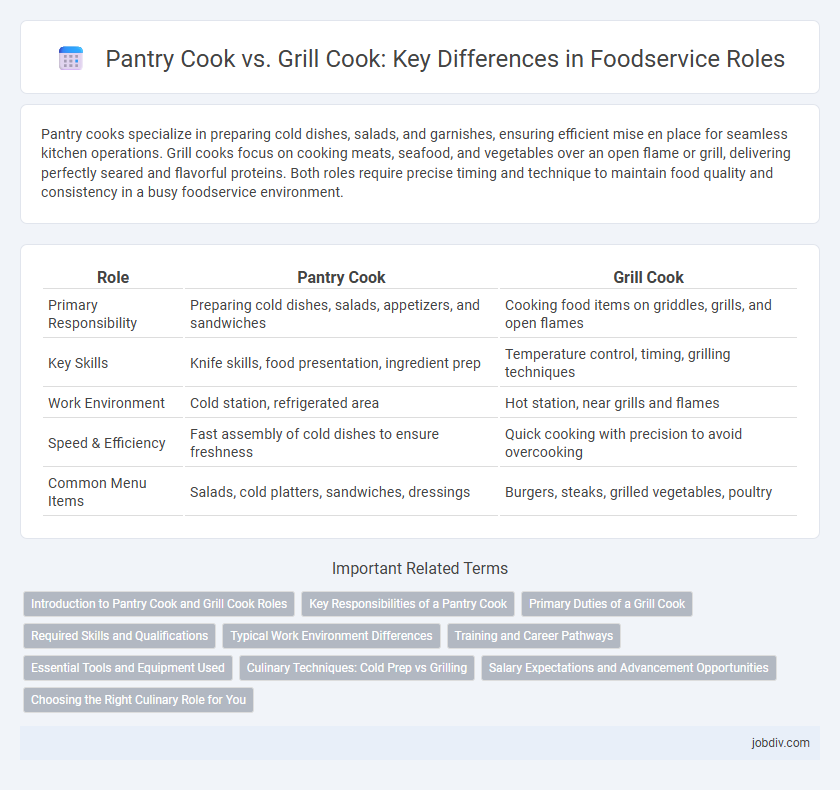Pantry cooks specialize in preparing cold dishes, salads, and garnishes, ensuring efficient mise en place for seamless kitchen operations. Grill cooks focus on cooking meats, seafood, and vegetables over an open flame or grill, delivering perfectly seared and flavorful proteins. Both roles require precise timing and technique to maintain food quality and consistency in a busy foodservice environment.
Table of Comparison
| Role | Pantry Cook | Grill Cook |
|---|---|---|
| Primary Responsibility | Preparing cold dishes, salads, appetizers, and sandwiches | Cooking food items on griddles, grills, and open flames |
| Key Skills | Knife skills, food presentation, ingredient prep | Temperature control, timing, grilling techniques |
| Work Environment | Cold station, refrigerated area | Hot station, near grills and flames |
| Speed & Efficiency | Fast assembly of cold dishes to ensure freshness | Quick cooking with precision to avoid overcooking |
| Common Menu Items | Salads, cold platters, sandwiches, dressings | Burgers, steaks, grilled vegetables, poultry |
Introduction to Pantry Cook and Grill Cook Roles
Pantry Cooks specialize in preparing cold dishes such as salads, dressings, and appetizers, ensuring freshness, accurate portioning, and clean presentation in a fast-paced foodservice environment. Grill Cooks are responsible for cooking and seasoning meats, poultry, and seafood on a grill or broiler, maintaining precise temperatures and timing to deliver consistently flavorful and safe-to-eat entrees. Both roles require strong organizational skills, attention to food safety regulations, and the ability to work efficiently under pressure in a team-oriented kitchen setting.
Key Responsibilities of a Pantry Cook
A Pantry Cook specializes in preparing cold dishes such as salads, sandwiches, and appetizers, ensuring proper ingredient handling and presentation. Key responsibilities include maintaining cleanliness and organization of the pantry area, managing inventory of perishable items, and supporting the kitchen staff by prepping ingredients in a timely manner. Unlike Grill Cooks who focus on cooking meats and hot items over direct heat, Pantry Cooks are essential for seamless service of chilled and ready-to-eat menu options.
Primary Duties of a Grill Cook
A Grill Cook's primary duties include preparing and cooking a variety of grilled foods such as burgers, steaks, and seafood with precise temperature control to ensure quality and safety. They manage grill stations, monitor cooking times, and maintain cleanliness to comply with health standards. Unlike Pantry Cooks who focus on cold food preparation and assembling salads or sandwiches, Grill Cooks handle high-heat cooking techniques essential for main dishes in foodservice operations.
Required Skills and Qualifications
A Pantry Cook requires proficiency in cold food preparation, knife skills, and knowledge of food safety standards to handle salads, dressings, and appetizers efficiently. In contrast, a Grill Cook must master grilling techniques, temperature control, and timing to ensure meats and vegetables are cooked to perfection. Both roles demand strong organizational skills, stamina, and the ability to work in fast-paced environments.
Typical Work Environment Differences
A Pantry Cook typically works in a cold food preparation area with refrigerated stations designed for assembling salads, sandwiches, and desserts, emphasizing cleanliness and organization. A Grill Cook operates in a high-heat environment near grills, broilers, and fryers, requiring effective ventilation and heat-resistant gear. Both roles demand fast-paced teamwork but differ significantly in temperature conditions and equipment used.
Training and Career Pathways
Pantry cooks typically receive training in cold food preparation, hygiene, and basic kitchen organization, serving as an entry point to culinary careers. Grill cooks require specialized skills in direct heat cooking, meat preparation, and temperature control, often advancing towards line cook or sous chef roles. Career pathways diverge as pantry cooks build foundational kitchen expertise while grill cooks develop complex cooking techniques for leadership positions in foodservice.
Essential Tools and Equipment Used
Pantry cooks rely on essential tools such as sharp knives, mixing bowls, cutting boards, and refrigeration units to prepare salads, cold dishes, and desserts efficiently. Grill cooks require specialized equipment including grills, spatulas, tongs, meat thermometers, and heat-resistant gloves to manage the cooking of meats and vegetables over direct heat. Both roles demand precise tools tailored to their specific cooking techniques to ensure food safety and quality in a professional kitchen.
Culinary Techniques: Cold Prep vs Grilling
Pantry cooks excel in culinary techniques involving cold preparation, such as assembling salads, dressings, and garnishes with precision and efficiency. Grill cooks specialize in high-heat grilling methods, mastering the art of searing meats, vegetables, and seafood to develop complex flavors and appealing textures. Both roles require distinct skills in temperature control and timing to ensure optimal food quality and safety in a fast-paced foodservice environment.
Salary Expectations and Advancement Opportunities
Pantry cooks typically earn a lower salary, averaging around $25,000 to $30,000 annually, with limited advancement opportunities primarily within cold food preparation roles. Grill cooks command higher wages, often ranging from $28,000 to $35,000 per year, benefiting from expanded skill sets that open pathways to grill station lead or broader kitchen supervisory positions. Career progression for grill cooks is more robust due to demand for versatile cooking expertise and increased responsibilities on hot food preparation lines.
Choosing the Right Culinary Role for You
Selecting the ideal culinary role depends on your skills and preferences in food preparation environments; pantry cooks specialize in cold dishes and salads, requiring strong attention to detail and knife skills, while grill cooks focus on cooking meats and hot items over direct heat, demanding quick timing and heat management. Understanding the distinctions in responsibilities, work pace, and culinary techniques between pantry and grill positions helps you align your strengths with the role that matches your career goals. Employers value candidates who demonstrate expertise in their chosen area, whether assembling fresh, visually appealing dishes or mastering grill temperatures for consistent flavor.
Pantry Cook vs Grill Cook Infographic

 jobdiv.com
jobdiv.com